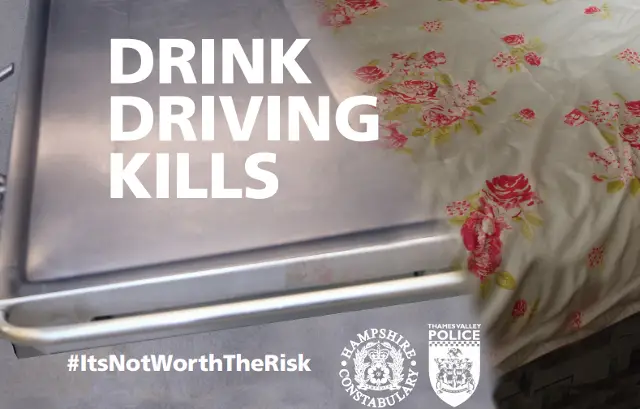This in from the police, in their own words. Ed
Hampshire Constabulary and Thames Valley Police have launched their month-long Christmas drink-drive reduction campaign.
The ‘Where will you end up tonight?’ campaign, which carries the hard-hitting theme of a mortuary to emphasise the potentially fatal consequences of drink-driving, is aimed at reducing the numbers of deaths and injuries caused on our roads by people who drive while impaired.
The campaign reinforces the stark message that motorists who drink-drive risk ruining not just their own life, but the lives of others too, such as passengers and pedestrians.
‘Where will you end up tonight?’
Hampshire Constabulary’s Road Safety Sergeant Rob Heard said:
“Too many people are still taking the risk to drive whilst impaired. Nearly 7,000 people were breathalysed by police across Hampshire and the Isle of Wight last December, with 150 people being arrested for providing a positive result, failing to provide or refusal. They could have caused a crash that killed or left someone injured with a lasting life-changing impact for themselves, family and friends.
“The campaign asks ‘Where will you end up tonight?’ illustrating that you could end up in a mortuary having died in a road crash caused by drink-driving. That could be in various circumstances; you could be a drink-driver who caused a collision, or you could be a passenger in the car of the impaired driver. Do not be tempted to get a lift from someone who will be over the limit as you are putting yourself in danger too.”
It’s not worth the risk
Sergeant Heard added:
“Hampshire Constabulary and Thames Valley Police remain dedicated to patrolling our roads to reduce the number of people who are killed or injured as a result of drink and drug driving.
“To anyone driving this December, please stop and consider the consequences of a loved one being told the devastating news that your reckless actions have caused the trauma and tragedy of a fatal collision.”
Reporting an impaired driver
If you believe someone is driving whilst impaired, please take action.
Phone Hampshire Constabulary on 101 or text 80999 with details of the vehicle, driver, location and times.
If you wish to remain anonymous, contact the independent Crimestoppers charity by phoning 0800 555 111.
Deaf access
If you are deaf, hard of hearing, speech impaired or deafblind you can use the following:
Emergency SMS – 999
Emergency Minicom TextRelay – 18000
You have to be registered to use this SMS service. Simply text ‘register’ from your mobile phone to 999 and follow the instructions. For more information visit www.emergencysms.org.uk
Non-emergency SMS – 07781 480999
Non-emergency Minicom TextRelay – 18001 101
Police 24 hour Fax 01962 874201
Alcohol risks
It is not possible to say how much alcohol you can drink and stay below the limit. The way alcohol affects you depends on:
- Your weight, age, sex and metabolism (the rate your body uses energy)
- The type and amount of alcohol you’re drinking
- What you’ve eaten recently
- Your stress levels at the time
People also need to be aware of driving the next day and how you may still be impaired: After just four pints of lager, you may not be safe to drive for up to 13 hours.
Whether you are drinking in the afternoon at a works Christmas party, or going out for a few drinks in the evening, make sure you are safe to drive.
Just because you haven’t had a drink for a few hours, it doesn’t mean all the alcohol has left your system and you can drive, you are still likely to be over the limit.
Consequences
A drink-driving conviction is a criminal conviction. Here are some of the consequences:
- Your car insurance could go up. Having a criminal record will make it extremely difficult to get any other kind of insurance
- To buy a mortgage you have to disclose any unspent convictions
- You may not be able to travel to America if you have a criminal conviction. Travelling to a country where you need a visa or a working permit can be very difficult with a criminal record.
- Colleges and universities will have policies about misconduct; getting in trouble with the police could have a knock on effect with your education
- Lying to your employer on any kind of application, which asks you to disclose any criminal convictions could be seen as fraud and lead to a further conviction.
- Getting into trouble with the law could be seen as gross misconduct by your employer and you could lose your job.
- Having a criminal record can make it very difficult for you to get another job.





